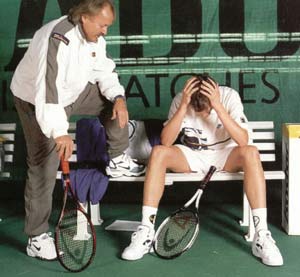|
Features
Since the sisters are now even more firmly entrenched in a power-up position and have made their point numerous times, it is time to get real serious about their tennis. It is time to learn to play their best tennis against each other to finally put to rest speculation about their motives and commitment to the game. Doing so is crucial to the integrity of the game and their legacy. Although it may be easier said than done, the Williams' sisters can learn to play their best when facing one another. Yes, the sisters can and need to learn much more about the mental side of the game. Up until now they have dominated more because of their physical and technical skills than their on-court psychological skills. Sure they show flashes of mental toughness, but these bursts of psycho-power are too few and usually interspersed with lapses in concentration. My solution. It is time to attack tennis psychology like they once tackled getting to the top. At this stage in their career they need to learn to peak for the big matches, especially when they play each other. Imagine what kind of tennis we would see if both played their best tennis when battling each other. Since both are very creative and talented girls I suspect they are high in certain psychological and behavioral measures that would make them very good candidates for an intervention technique called Active-Alert hypnosis (more on this later in TennisONE). Using this technique I could prepare the girls in such a manner that they would be virtually oblivious to the fact that the opponent on the other side of the net is a sister.
Being able to sublimate emotions associated with playing a sister or brother is a major step toward freeing oneself from the self-induced psychological constraints that often limits top motor performance when siblings play each other. Active-alert and self-hypnosis using a potent induction and posthypnotic suggestions can go a long way toward keeping distracting stimuli at bay. Again, since I believe the Williams sisters would be good candidates for these forms of mental training, they should eventually give it a try with a skilled and tennis savvy Sport Psychologist having training in hypnosis. Should an evaluation determine they are not ideal candidates for hypnosis other forms of intervention can be tested including the Carlstedt Protocol. The goal being, regardless of mental training technique, to achieve better self-regulation especially in the case of Serena. Since both girls are very intelligent I believe they would be excellent clients and excited about the possibility of learning more about their own psyche and the mental game. They've learned a lot about the foundations of mental toughness in a naturalistic way, now they need to advance to a more sophisticated level to be even in greater control of their psyche and the game that has brought them so much. Your comments are welcome. Let us know what you about think this article by emailing us here at TennisONE. Dr. Roland A. Carlstedt has followed the professional
tennis tours since 1985, fulltime from 1989-1998 in which he on average
attended 25 tournaments a year including all Grand Slam events and
important Davis Cup ties. During this time he complied perhaps the most
extensive database in existence on the psychological performance,
tendencies, and profiles of most ATP and WTA players. His annual
Psychological World Rankings for Tennis have been published since 1991
more than 500 times in over 40 countries. His rankings and data are based
on his Psychological Observation System for Tennis. Interestingly his 2000
rankings which were released prior to the 2001 Australian Open had 2 of 4
semifinalists and 8 of 16 quarterfinalists on them including such unlikely
players as Arnaud Clement and Sebastian Grossjean. His 2001 rankings will
appear in TennisONE at the end of the year.
|
Last Updated 9/7/01. To contact us, please email to: webmaster@tennisone.com TennisONE is a registered trademark of TennisONE and SportsWeb ONE; Copyright 1995. All rights reserved. |
||||||



